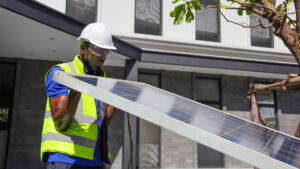This story was originally published by Grist. Sign up for Grist’s weekly newsletter here.
By Syris Valentine, Grist
The idea of a national “green bank,” which would lend public money to help cash-strapped businesses and individuals invest in things like solar panels and energy-efficiency upgrades, has been kicked around since at least the first Obama administration. But it wasn’t until President Joe Biden signed the Inflation Reduction Act into law in 2022 that the federal government set aside money, through the bill’s $27 billion Greenhouse Gas Reduction Fund, for this express purpose.
On Thursday, Vice President Kamala Harris and Environmental Protection Agency Administrator Michael Regan announced that the administration is ready to start signing checks. But rather than centralizing the funding in a single bank, the administration is routing the money — $20 billion of the total so far — to eight selected applicants, representing more than a dozen local nonprofits.
The idea is that these trusted intermediaries, which have track records investing in local projects already, can better inject the loans directly into communities, with the vast majority of funding going to low-income and disadvantaged recipients. The hope is to provide communities with access to the capital they need to invest in a clean local economy — according to a vision recipients define for themselves.
“We have the capacity with this approach to empower communities to decide which projects they want that will have the greatest impact from their perspective in the place they call home,” Vice President Harris said at the announcement event in Charlotte, North Carolina. “We can invest in those projects in a way that will actually have value for the people that live there — instead of us from Washington, D.C., telling us what you need.”

In Charlotte, Vice President Harris visited Grier Heights, a historically Black neighborhood where a community bank called Self-Help has facilitated investments to insulate, weatherize and electrify nearly 50 homes. The vice president highlighted that these efforts not only created jobs for the contractors who did the work and reduced the carbon footprint of each of the homes, but they also improved the lives of families inhabiting them. When she visited the Grier Heights home of one father and small business owner, the resident told Harris that his combined gas and electric bill had been cut from $600 a month down to around $100 a month after he moved into one of Self-Help’s energy-efficient homes. Those savings allow him and his spouse to spend more on childcare and set aside savings for their children.
Self-Help and another community-based lender have partnered with the nonprofit Climate United Fund to invest the nearly $7 billion they were awarded through the green bank program in projects that hope to support families, schools, small businesses, community organizations and other local institutions. They intend to invest at least 60% of those funds in low-income and disadvantaged communities, 20% in rural communities and 5% in tribal communities.
The other community-based financial institutions that will receive the remaining $14 billion announced on Thursday — which will be facilitated by the National Clean Investment Fund and the Clean Communities Investment Accelerator — have similar goals for the kinds of projects and communities they support. One awardee, the Native CDFI Network, intends to focus its efforts on reservations and in Native communities.
These grants, along with a $7 billion “Solar for All” grant expected to be announced later this spring, represent “the single largest climate investment in the Inflation Reduction Act,” according to a press release quoting Massachusetts Sen. Edward Markey, a Democrat who supported the law.
The funds are designed to do far more than simply inject public funds into communities that need them — they are also intended to catalyze further investment. The EPA expects every dollar of federal investment to spur $7 in private spending. If this projection is correct, then this multiplier would exceed the similar effect observed in separate Inflation Reduction Act provisions. (A recent analysis found that the law’s tax credits drummed up $5.50 of private investments for every $1 in credits.) This means that the Greenhouse Gas Reduction Fund could lead to nearly $200 billion in green investment.
Though the idea is that these sorts of effects will make the program a win-win-win for the climate, local communities and the government, the green bank project is not without its critics. One member of Congress, a Republican representing Alabama, called the effort a “green ‘slush fund’” when he tried to repeal the green bank program earlier this year, saying that the program has insufficient accountability and oversight to ensure money is not wasted. In a vote cast almost entirely along party lines, the bill passed the House of Representatives and was sent to the Senate. While it has yet to receive a vote in the Democrat-controlled Senate, President Biden issued a statement making clear that he would veto the attempted repeal.
“When we expand access to capital and give every person in our nation — no matter who they are or where they live — the opportunity to pursue their dreams,” the vice president said on Thursday, “we build a cleaner, healthier, and more equitable and more prosperous future for everyone.”
This article originally appeared in Grist at https://grist.org/equity/green-bank-greenhouse-gas-reduction-fund-kamala-harris/.
Grist is a nonprofit, independent media organization dedicated to telling stories of climate solutions and a just future. Learn more at Grist.org.
Sign up for The Invading Sea newsletter by visiting here. If you are interested in submitting an opinion piece to The Invading Sea, email Editor Nathan Crabbe at nc*****@*au.edu.
“>



